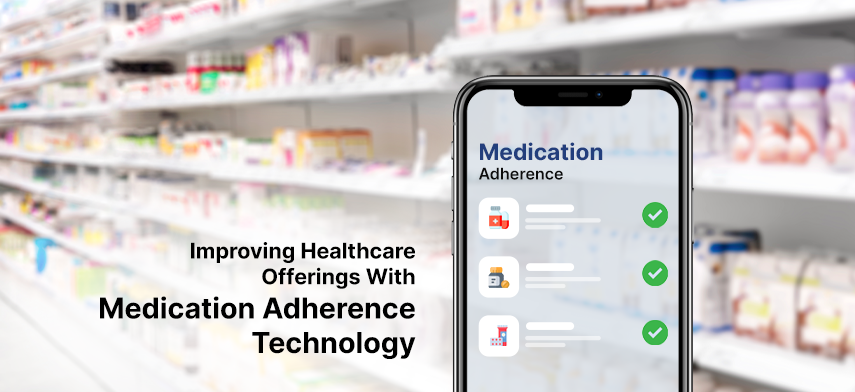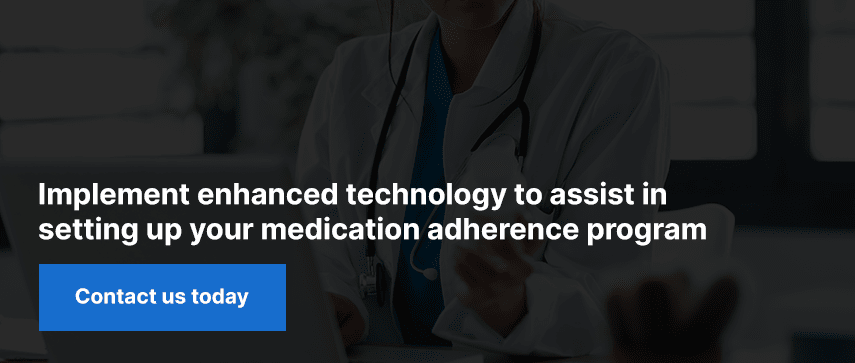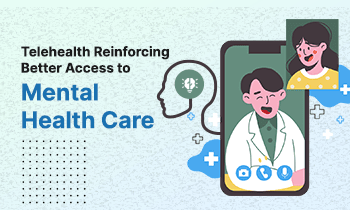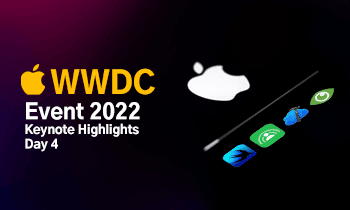We often go with the medicines prescribed by the doctor, which may not be consumable. Prescribed drugs cannot always be enough to provide better healthcare. Medication adherence is a crucial factor in improving patients’ health.

Medication adherence is the extent to which your behavior corresponds with the healthcare provided by medical professionals. Many factors such as poor financial circumstances and lack of accessibility affect adherence to medicines. Without adherence, patient outcomes, especially in severe and chronic diseases like hypertension or diabetes, become very negligible.
Let us understand the importance of medication adherence technology in healthcare.
Data Analytics and Cost Impacts of Non-Adherence
Medical non-adherence can have negative impacts on both the patients and the care provider. If a patient cannot take or continue prescribed medicines, their health will not improve. The reasons for this non-adherence can be many things:
- Often patients consider medications unnecessary due to a lack of medical guidance.
- The financial conditions of the patients prevent them from purchasing expensive medicines.
- Patients with chronic illnesses and no caregiver present may be unable to go out and buy drugs.
The consequences of medical non-adherence include lower quality of life, progression of illnesses, and waste of medicines. Apart from this, non-adherence can potentially increase the load on the medical system of a country. If patients do not adhere to prescribed drugs, then the chances of being admitted to hospitals with severe cases of disease increase exponentially.
A higher rate of hospital admission also raises the cost burden on the patients’ families. Let’s look at some statistics from various case studies and research:
- Non-adherence is the cause of almost 40% of admissions in nursing homes. It’s also why patients spend an extra $2,000 per year in the form of visits to the physician.
- Compared to adherent diabetics, almost 80% of the time, non-adherent diabetics are 2.5% more likely to need hospitalization.
- Non-adherent patients suffering from high blood pressure have a 17% more chance of hospitalization due to severe cases of heart failure, coronary diseases, and cerebrovascular diseases. The hospital costs for such patients are more than those of adherent patients by at least $3575.
- Studies show that we could reduce hospitalization charges by over $25 million if medical non-adherence was not a vast concern.
Methods to Improve Medication Adherence
From the above data analytics, we can safely say that patient medication adherence is vital in healthcare for both doctors and patients. It can be challenging for doctors if patients are non-adherent. It’s crucial to be clear in explaining the benefits of medication and possible side effects. Medical and healthcare professionals should make their patients aware, as information and awareness can improve their responses and behaviors towards medicines.
In the 21st century, we are slowly looking at the emergence of medication adherence technology. But before we can discuss the technological solutions, let’s look at some simple methods healthcare professionals can apply to improve patient medication adherence.
1 Prescribing levels
By prescribing medicines at manageable levels – one pill a day – medical professionals and doctors can help improve medication adherence. A smaller number of tablets can also mean lesser expenses and can help financially struggling patients adhere better.
2 Communication is key
Make sure that as a doctor or a healthcare professional, you are communicating with your patients well. You need to know what background they belong to and what kind of issues they may face when trying to attain access to medicines. Prescribing medicines by keeping these factors in mind can significantly better patient medication adherence.
3 Follow-ups
Schedule regular follow-ups to understand if your medication adherence program is working with your patients or not. Doctors need to ensure quality value-based care over quantitative health outcomes.
Screening COVID-19 in a Mobile Medicine Setting
Medication adherence technology can help improve patient healthcare by assisting them in taking and continuing prescribed medicines. A small example of how technology can help people deal with medical emergencies is the widespread use of telehealth facilities during the COVID-19 pandemic.
The COVID-19 crisis made it impossible for people to move out and go to hospitals. Even when they had symptoms, they could not risk going to hospitals because of the greater risk of the virus exposure to other people. During such a critical time, mobile medical help came to the rescue.
The following are the different methods by which we can use technology to screen COVID-19 effectively include:
1 Virtual communication
Doctors can talk over the phone with patients and judge if their symptoms require immediate medical attention in a hospital or home isolation.
2 Remote health facilities
It can help prevent more people from getting infected. With the help of remote contact tracing, we can determine who the COVID patients have been in contact with.
3 Community volunteers
Community volunteers can assist patients with virtual communication via digital devices. They can use telehealth facilities to communicate to hospitals in case of COVID emergencies.
4 Remote evaluation methods
Recovering patients also need monitoring. These remote evaluation techniques can help doctors keep in touch with patients recovering from the deadly virus.

Improving Healthcare Through Technology
This is an era where people are regularly making technological breakthroughs. These rapid innovations help make people’s lives easier, safer, and better. There is a need to create a value-based care system to meet the increased demand for digital tools in the medical workflow.
People want these tools to understand their health better. Hospitals are much like any other product-selling sector, where patient experience and satisfaction are vital to their efficient functioning.
Booking an appointment with the appropriate physician at the right time becomes hectic because most working people’s schedule does not match with the physician’s. Just like any other commercial sector, consumers in the medical industry also want instant services. Attending follow-ups can significantly increase medication adherence in patients, leading to an improvement in overall health.
Here are some ways that technology improves healthcare outcomes and general patient experience:
1 On-demand services
If you want to buy tablets, you can type a few words on an app, click a few buttons, and your medications will be on their way to your home. Technology has made life that simple! But when it comes to getting medical attention, administrative processes are often frustrating. Introducing digital tools in the healthcare sector can help solve this issue for consumers. With the help of telemedicine facilities, people can book appointments according to their convenience and receive medical aid whenever the requirement arises. Online managed care pharmacy is also a medication adherence technology as it can help people keep appointments they would otherwise miss due to busy schedules.
2 Big data analysis
Big data helps gather valuable information about an enterprise and creates predictive trends and patterns for future purposes. The many benefits of using big data analysis in the healthcare sector include:
3 Decreased rate of errors in medication
Big data can create an effective medication pattern by collecting patients’ past and present medical history, including the doses. Big data prediction can help flag inconsistencies between patient’s health and their prescriptions. Through this, doctors will be aware of a medication error, leading to decreased medication nonadherence in patients.
4 Preventive care facilitation
Many patients are regulars in hospitals, which means they come by frequently due to the recurrence of chronic illnesses. With the help of big data analysis, healthcare professionals can create a value-based care system and a preventive plan to keep these people from becoming regular patients.
5 Focussed staffing
A significant issue that hospitals face is understaffing. This issue became particularly evident during the recent COVID-19 emergency. Even under normal circumstances, healthcare systems lack adequate staff. Big data analysis can help predict future hospital admission rates, possibilities of diseases, and the number of medical staff required for proper attention based on present trends. In turn, this can help hospitals appoint the necessary staff they require.
Impact of Medication Adherence Technology
Medication adherence technology can range from reminder systems to automated detection systems. Big data analysis can play a big part in helping with patient medication adherence by predicting patient behavioral patterns. It can help create a well-suited prescription, keeping in mind the socio-cultural backgrounds of patients.
New innovative technology also allows physicians to hand out soft copies of prescriptions via prescription management apps. For people with chronic illnesses who cannot physically visit doctors, such apps can make it easier to receive drug prescriptions and maintain a proper medication regime.
Mobisoft’s pharmacy management services can help create effective medication adherence tools to help pharmacists, healthcare professionals, and patients. We have prescription managing solutions and online pharmacy app solutions, which will help you create a more comprehensive healthcare structure.
Final Thoughts
Medication non-adherence is a severe issue among patients living varied lifestyles. For the medical system, it is imperative to find a quick and effective solution to help patients adhere to their medicine regimes strictly, as this will help improve their health and prevent future complications. Hospitals can do this only if they adopt new medication adherence technology immediately.

Author's Bio

Shailendra Sinhasane (Shail) is the co-founder and CEO of Mobisoft Infotech. He has been focused on cloud solutions, mobile strategy, cross-platform development, IoT innovations and advising healthcare startups in building scalable products.


